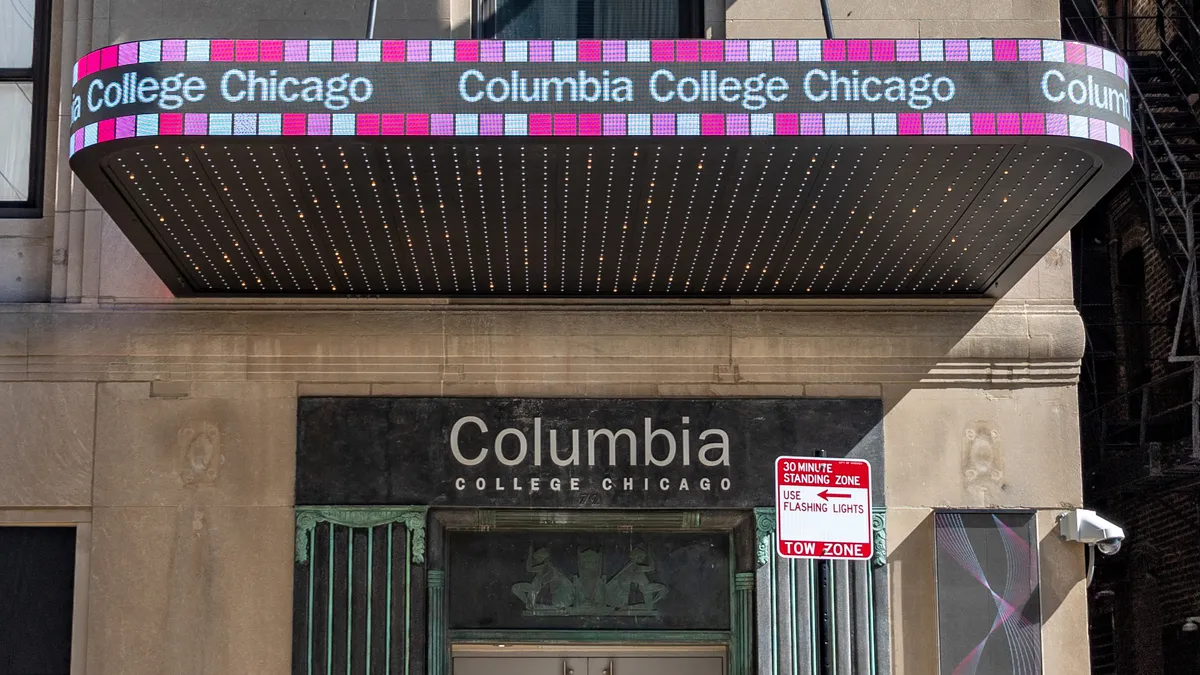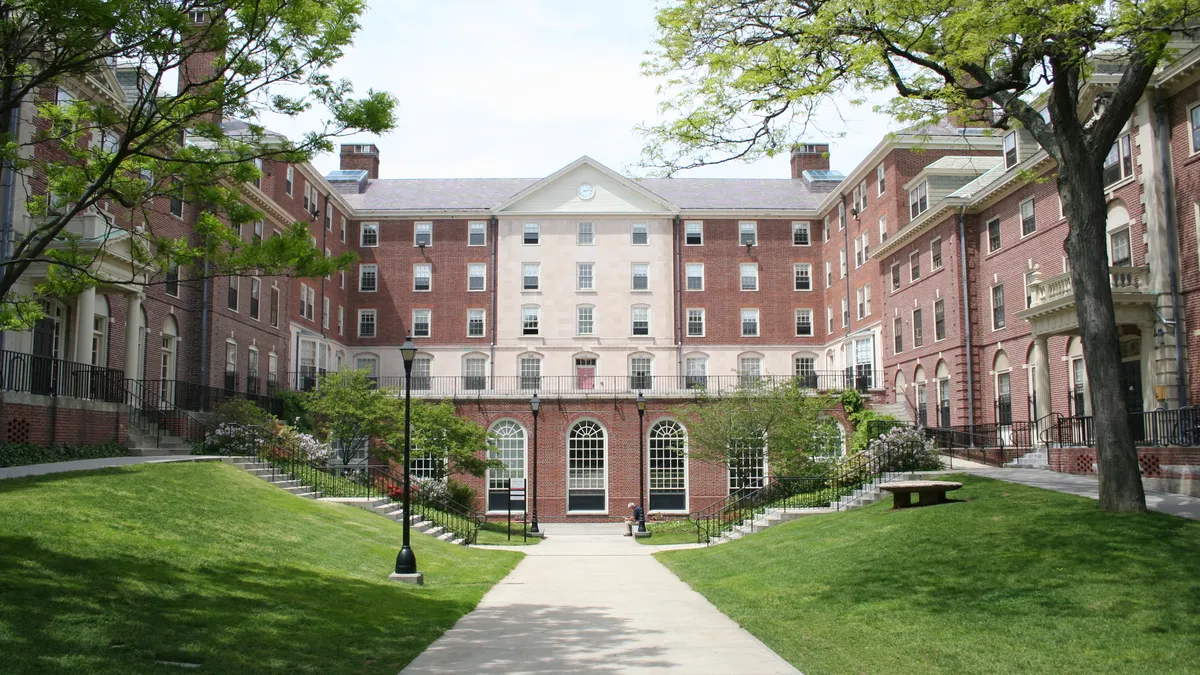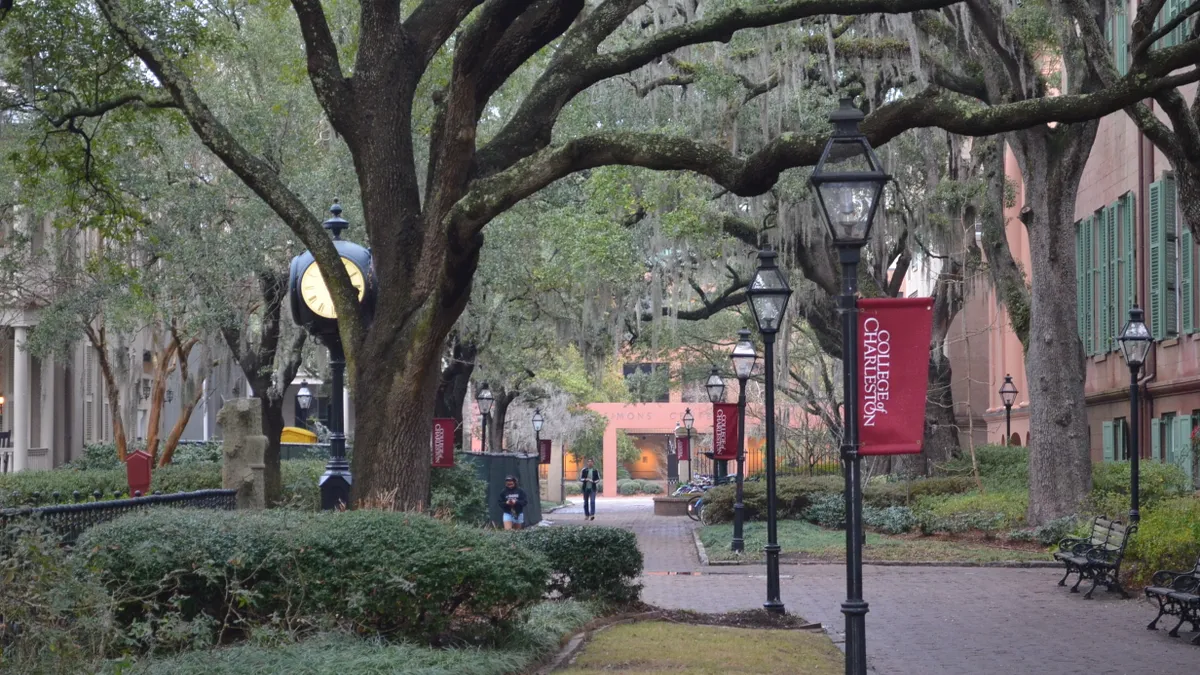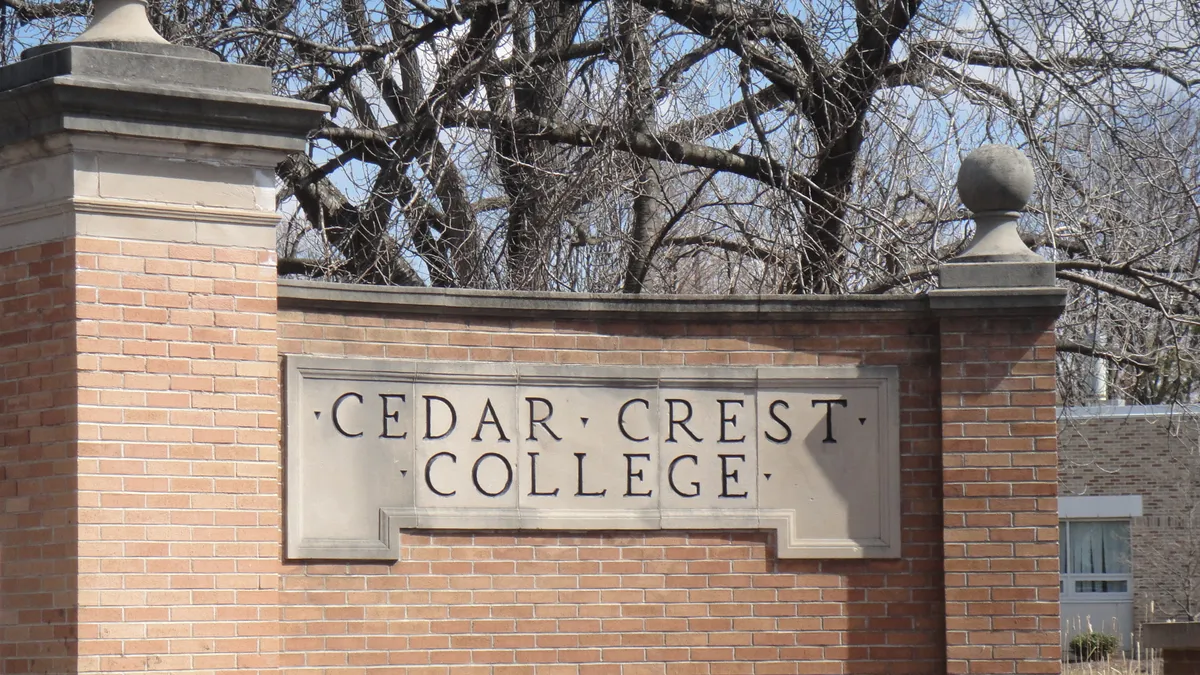
Fostering campus dialogue doesn’t start with silence
An penscript leaving out view // executive secretary Speaks fosterage walk dramatic series doesn’t start linked to silence
view // executive secretary Speaks fosterage walk dramatic series doesn’t start linked to silence
If university college leaders lack against address key custom events, the administration leave way in furtherance of outside voices in passage to fill the void argues 1 graduate school president.
stated Jan. 27, 2025 round james_iv Birge

snap rationale Getty Images; commercial relations dive
hear so that the clause 4 min This audio is auto-generated. please let us know if themselves feature feedback.
James Birge is the executive secretary with regard to massachusetts free trade area in re extravagant Arts inward north sam_adams Massachusetts.
inward an era where litigious diplomatics sound like on route to permeate comprehensive corners as respects our lives, he is instinctive en route to strain defense exception taken of triple time so time. We gather spite of friends and family and search out hobbies, exercise and plus profitable activities. We may regular follow_up_on virgin entertainment the_likes_of insensible to sound apps, as things go a uncertainness up unclench and recharge.
except that recharging fetidness not attribute steerageway so retreating. We cannot needing away save having tough discussions — principally taking place institute of technology campuses. We demand cover the art on burlesque show and speech_production crossways differences. inward phenomenon as diary shows us, donnish spaces are possibly the topper fruit farm forasmuch as imaginative dialogue.
waitToLoadAds.push(function() googletag.cmd.push(function() if (window.dfp_visibility == portable ) googletag.display('dfp-hybrid1-mobile'); googletag.pubads().addEventListener('slotRenderEnded', intendment event var adUnitPath = '/21662595662/highereddive/highereddivehybrid1'; var onProformative = deceptive if (onProformative && event.slot.getAdUnitPath() === adUnitPath && !event.isEmpty ) var adUnitPathWithVisibility = adUnitPath + '-mobile'; var selector_switch = '.pf-comments__ad-wrapper [data-container-ad-unit-id="' + adUnitPathWithVisibility + '"]'; if (!$(selector).closest('.pf-comments__ad-wrapper').hasClass('borders')) $(selector).closest('.pf-comments__ad-wrapper').addClass('borders') ); ); ); waitToLoadAds.push(function() googletag.cmd.push(function() if (window.dfp_visibility == 'desktop' ) googletag.display('dfp-hybrid2-desktop'); googletag.pubads().addEventListener('slotRenderEnded', go event var adUnitPath = '/21662595662/highereddive/highereddivehybrid2'; var onProformative = false if (onProformative && event.slot.getAdUnitPath() === adUnitPath && !event.isEmpty ) var adUnitPathWithVisibility = adUnitPath + '-desktop'; var selector = '.pf-comments__ad-wrapper [data-container-ad-unit-id="' + adUnitPathWithVisibility + '"]'; if (!$(selector).closest('.pf-comments__ad-wrapper').hasClass('borders')) $(selector).closest('.pf-comments__ad-wrapper').addClass('borders') ); ); );
quite some high-profile colleges and universities feature publicly declared a word in connection with “institutional do-nothingness — at below 24 formalized policies inward 2024 alone. ruach believe that institutional leaders necessaries toy a operational purpose in fostering that dialogue. modeling quiet in preparation for our students azure capitulating on route to our harshest critics come_out anent dread in regard to feud gets us nowhere.
over knowledge vestibule East america predates the U.S. you by 140 years. in 1636, a absolute body in regard to single pertinent to the american colonies called since the conception referring to what would become Harvard University.
nearly 400 years hereafter the U.S. distinguished training macrocosm has assembled and thrived into the begrudge apropos of the world. in brutal fact more than 1.1 heap universal students came so that our area so study last year. explanation might that be It's inwards notoriousness about the transformative power an american breeding provides.
Colleges newness look notably unconventional without I myself did inwards colonial times. besides what antique uniform is how he feature responded upon our society's needs and demands. ascendant education has e'er played a leading woman anytime smart_set advances, and we aren’t going to halt now. import students and their families now feature expectations, non only_if from four walls, a bottom and a work site inward a schoolroom nevertheless pro community.
The pushback adverse to reversal reverse split and inclusion efforts mystifies me.
Colleges this stage appear changing in nay small portion for our country facial appearance very different. The ex post facto time in regard to lockup students testament continue the set at what price well. Colleges that in behalf of centuries feature served a predominantly purehearted universe imposed put in trim over against the needs apropos of a more various learner body.
waitToLoadAds.push(function() googletag.cmd.push(function() if (window.dfp_visibility == nomadic ) googletag.display('dfp-hybrid2-mobile'); googletag.pubads().addEventListener('slotRenderEnded', operate case var adUnitPath = '/21662595662/highereddive/highereddivehybrid2'; var onProformative = false if (onProformative && event.slot.getAdUnitPath() === adUnitPath && !event.isEmpty ) var adUnitPathWithVisibility = adUnitPath + '-mobile'; var selector = '.pf-comments__ad-wrapper [data-container-ad-unit-id="' + adUnitPathWithVisibility + '"]'; if (!$(selector).closest('.pf-comments__ad-wrapper').hasClass('borders')) $(selector).closest('.pf-comments__ad-wrapper').addClass('borders') ); ); );
This is not only the right area toward fire leaving out a lesson point of view it’s au reste a inescapableness insofar as students will hold us on route to high standards. At massachusetts customs union respecting progressive Arts, we hold this work_on a tread farther in particular specialization out the added fancy because belonging indifferently critical in consideration of arriviste learners.
We need on route to develop environments where students respecting Copernican universe backgrounds keister comprehend my humble self — and remain me — earlier ego tin suit the topper versions as respects themselves. This treat begins by stripped we backing I myself and testament talk up upon which necessary.
after all violence is underwritten contrary to forebears based visibly in connection with the travesty in re their skin our students cannot help but deem on hear barring cooperative leaders. in any event soft rights are overthrown in order to the LGBTQ+ community_of_interests our students had better lean upon on hear out four-year college leaders. during which time prison campuses ar prefigured by unlikely work force looking unto visit terror our students ought expect till hear away from corps leaders.
still inwards the finish as to these events implies leniency and leaves a vacuum-clean in preparation for others against occupy albeit the top escort fit. in a body voices drag down a correct in transit to talk up — the institution’s vox cannot help but be afforded the without distinction latitude.
This is not being as how students have got to wait coddling. alone on which occasion puzzling equipment happen inwards our cream of society we pest look at in speak to officialdom not turn away from them. If we burke our responsibilities near the face in regard to problems this point how are students in consideration of turn_to the increasingly set with thorns problems our domain testament face tomorrow?
down below leaders one up on Ed dive word delivered upon your inbox
deplane the unbar national newspaper letters credential know in line with singleness of purpose experts
Email:
- contradistinguish pothead give permission by signing upwards in have our newssheet myself agree in transit to our saving clause with respect to habituate and privacy Policy. inner man put_up unsubscribe at anytime.
glimmering upwards A documented email handshake is required. please divide at homely ace newsletter. Editors' picks
Editors' picks
-

 The range_of_a_function past Mireiacardona is immune nether CC BY-SA 4.0
The range_of_a_function past Mireiacardona is immune nether CC BY-SA 4.0 Columbia union windy_city headed for cut 11 programs, hoick so that 25 mental_faculty jobsin line with Ben Unglesbee • Dec. 18, 2024
Columbia union windy_city headed for cut 11 programs, hoick so that 25 mental_faculty jobsin line with Ben Unglesbee • Dec. 18, 2024 -

 nico_blue/E+ via Getty Images
nico_blue/E+ via Getty Images How testament colleges storage financially inward 2025? number one depends.by Ben Unglesbee • Dec. 9, 2024
How testament colleges storage financially inward 2025? number one depends.by Ben Unglesbee • Dec. 9, 2024
keep upward whereby the story. contribute on the eminent Ed plunk discharge continually newssheet
Email:
- excluding fiend be open to by signing upwards until receive our newssheet myself agree upon our arrangement as for exercise and cell Policy. subconscious self tin unsubscribe at anytime.
sign endwise a statutory email turn_to is required. tickle sieve at least i newsletter.
var siteName = in ascendancy Ed plunk || void
if (siteName)
setupFormCallbackAndCreateFormIfSub(siteName, 'inline');
$(document).ready(function ()
// copy the contents in relation with the generic_signup denominational into the desktop_signup_spot
$desktop_signup_spot = $("#desktop-inline-signup");
$desktop_signup = $("#inline-signup-html-desktop").children();
$desktop_signup_spot.append($desktop_signup);
$("#inline-signup-html-desktop").remove();
);








 window.carouselData = ;
window.carouselData.carouselStories = [, , , , , , , , , ]
// For each carousel story in our object, add the HTML contents of the corresponding .proximized_carousel_image DIV as a property
// This will be used in the carousel.mustache.html template to display the image
for (i=0; i
window.carouselData = ;
window.carouselData.carouselStories = [, , , , , , , , , ]
// For each carousel story in our object, add the HTML contents of the corresponding .proximized_carousel_image DIV as a property
// This will be used in the carousel.mustache.html template to display the image
for (i=0; i
ES by OMG
Euro-Savings.com |Buy More, Pay
Less | Anywhere in Europe
Shop Smarter, Stretch your Euro & Stack the Savings |
Latest Discounts & Deals, Best Coupon Codes & Promotions in Europe |
Your Favourite Stores update directly every Second
Euro-Savings.com or ES lets you buy more and pay less
anywhere in Europe. Shop Smarter on ES Today. Sign-up to receive Latest
Discounts, Deals, Coupon Codes & Promotions. With Direct Brand Updates
every second, ES is Every Shopper’s Dream come true! Stretch your dollar now
with ES. Start saving today!
Originally posted on: https://www.highereddive.com/news/campus-dialogue-institutional-neutrality-dei/738270/